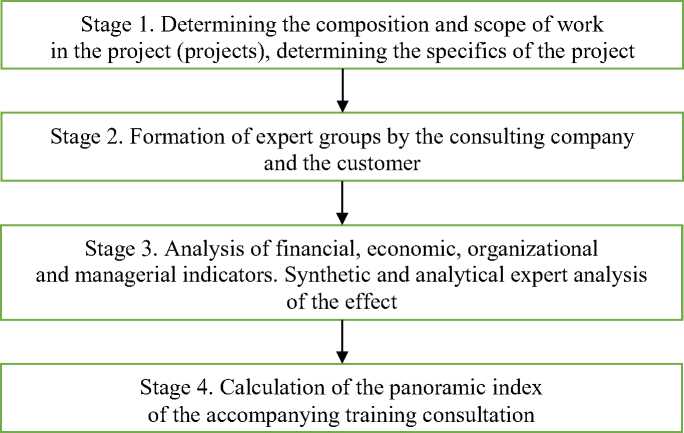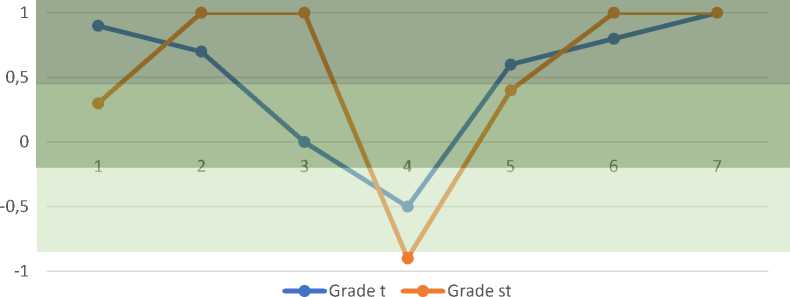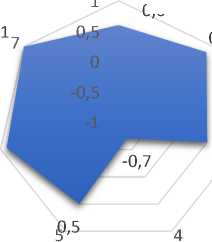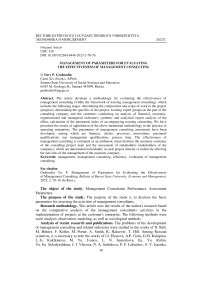Management of parameters for evaluating the effectiveness of management consulting
Автор: Grabozdin Yury P.
Статья в выпуске: 2, 2023 года.
Бесплатный доступ
The article develops a methodology for evaluating the effectiveness of management consulting (within the framework of training management consulting), which includes the following stages: determining the composition and scope of work in the project (projects), determining the specifics of the project; forming expert groups on the part of the consulting company and the customer; conducting an analysis of financial, economic, organizational and managerial indicators; synthetic and analytical expert analysis of the effect; calculation of the panoramic index of accompanying training counseling. We have presented the results of approbation of the above-mentioned methodology in the practice of operating enterprises. The parameters of management consulting assessment have been developed, among which are finances, clients, processes, innovations, personnel qualifications, top management qualifications, process time. The effectiveness of management consulting is estimated as an arithmetic mean between the summary estimates of the consulting project team and the assessment of stakeholders (stakeholders of the company), which are determined individually in each project directly or indirectly affecting the activities of the management of the customer company.
Management, management consulting, efficiency, evaluation of management consulting
Короткий адрес: https://sciup.org/148326478
IDR: 148326478 | УДК: 338 | DOI: 10.18101/2304-4446-2023-2-70-76
Текст научной статьи Management of parameters for evaluating the effectiveness of management consulting
Grabozdin Yu. P. Management of Parameters for Evaluating the Effectiveness of Management Consulting. Bulletin of Buryat State University. Economy and Management. 2023; 2: 70‒76 (In Russ.).
The object of the study. Management Consultants Performance Assessment Parameters.
The purpose of the study. The purpose of the study is to disclose the basic parameters for assessing the activities of management consultants.
Research methodology. This article uses the results of the author's research based on the comparative analysis of the management consultants' activities in the implementation of projects at the customer's enterprise. The following methods were used: analysis, observation, modeling, as well as sociological methods.
Analysis of recent research and publications. The problems of the development of management consulting and related industries were studied in the works of D. Bell, M. Bittner, F. Kotler, M. Porter, A. Smith, K. Haksever, T. Hill. Among Russian scientists, it is necessary to note the works of I.I. Eliseeva, A.P. Gorn, G.M. Kulapina, L. G. Kukhtinova, M. Yu. Ivanov, L. N. Semerkova, Eu. Yu. Rubin, Yu. Eu. Solodyashkina, J. I. Vlasova, N. A. Salnikova, P. F. Lobachev, S. V. Isaenko,
A. M. Muravyev, V. V. Gerasimov, I. V. Yakhneeva, S. V. Noskov, M. V. Botnariuk, O. G. Melchekova, N. A. Serebryakova, A. P. Zhabin, E. A. Kandrashina et al. [1-9]. In turn, the issues of organizational evaluation of the formation and development of management consulting remain insufficiently studied, which further increases the level of relevance of the topic of this work.
The results of the study. Based on the fact that the author of this study considers management consulting as a mechanism for improving the management of the customer company, this fact implies the formation of a comprehensive methodological approach to assessing the effectiveness of consulting itself in the management system of the enterprise. Let's consider the main elements of the proposed method. A methodology for assessing the effectiveness of management consulting using accompanying training consulting, which is designed to assess the effectiveness of the interaction between the management consultant and the client. This includes financial analysis and peer review. The structural diagram of the procedure is shown in Figure 1.

Figure 1. Structural diagram of the methodology for assessing the effectiveness of management consulting using accompanying training consulting
For a comprehensive assessment of effectiveness, the use of a panoramic index of accompanying training counseling is proposed, reflecting summary data on the assessment of various indicators / effects (in accordance with the indicators stated in the contract) on the part of the customer and the consulting company (groups of consultants [1,6,7,4,8]).
, S E„
I S E 2 i
I — the panoramic index of accompanying training counseling
Е 1 i — the effect calculated by the customer's expert team
E 2 i — the effect calculated by a team of expert consultants
Accompanying training counseling was used by the author of the study in projects when organizing management consulting in the Samara, Penza, Rostov regions and in the Czech Republic.
Table 1 presents the results of the above work, which confirm in practice the feasibility of the stated goals in the process of interaction between management consultants and customer enterprises. The presented results of the adequacy and effectiveness of the method proposed by the author of the present study.
Summary of Accompanying Training Counseling Results
Table 1
|
Indicators |
AO "PROM-ENERGO-KOMPLEKT" |
CKD BLANSKO HOLDING A.S. |
|
Operational objectives of the enterprise |
Implementation of new corporate standards for quality management and training of personnel |
Revenue growth |
|
Consultation support period |
2022 |
2021 |
|
Financial and economic indicators at the end of the support period |
Revenue growth (2,3%) Net cash flow (+4,4%) |
Revenue growth (4,3%) Net cash flow (+2,2%) |
|
Organizational and management results of support |
Management costs (-1,3%) Number of management personnel (-3%) |
Management costs (-4,3) Number of management personnel (-5%) |
|
Other results |
Increase of labor productivity, training of management staff |
Organization of M&A processes and organizational optimization |
Methodology for assessing the effectiveness of management consulting activities. Despite the fact that the results of consulting activities can be determined in the form of dynamics of qualitative and quantitative indicators, which are equally understood and interpreted by the participants in the implemented consulting projects, difficulties arise taking into account the specific manifestations and results of management decisions and other factors of the external and internal environment that could directly or indirectly affect the result.
As a result. The method of expert assessments is proposed, where the experts are project participants (team from the contractor and customer)
In the proposed methodology, the effectiveness of management consulting is proposed to be evaluated in the form of a product of the total result by the share coefficient of the contribution of management consultants to the final result with an adjustment to the assessment of the implemented consulting project by stakeholders who are determined individually in each company and can include a wide list of participants from owners to regulatory bodies and the media. Therefore, the target efficiency of the management consulting project is defined as the ratio of the initial and subsequent state of the enterprise management system.
The following elements are selected by the parameters of the management system assessment, according to which the following elements will be monitored: finance, clients, processes, innovations, personnel qualification, qualification of top management, process time, and the effectiveness of management consulting is assessed as the arithmetic mean between the consolidated assessments of the consulting project team and the assessment of stakeholders (stakeholders of the company), which are determined in each project individually directly or indirectly affecting the activities of the customer company management. (Table 2).
Table 2
Example of Management Consulting Performance Assessment
|
Indicator MS |
Grade (max) |
Average grade (team) |
Average grade st |
|
Finance |
1,0 |
+0,9 |
+0,3 |
|
Clients |
1,0 |
+0,7 |
+1,0 |
|
Process |
1,0 |
0 |
+1,0 |
|
Innovations |
1,0 |
-0,5 |
-0,9 |
|
Qualifications (personnel) |
1,0 |
+0,6 |
+0,4 |
|
Qualification (top) |
1,0 |
+0,8 |
+1,0 |
|
Process time |
1.0 |
+1,0 |
+1,0 |
|
Total |
7 |
3,5 |
3,8 |
|
Average |
Х |
3,65 |
|
The maximum possible grade for each of the control system indicators is 1 point. In total, the maximum possible amount for all indicators is 7 points.
Estimates of project participants and stakeholders can be as follows: + 1.0 point (achievement of the result. Effective value), 0 points — neutral value, the indicator did not change the value, -1.0 point, (unsatisfactory result). Graphically, this approach can be represented as a scale that defines the areas of effective and ineffective management consulting (Figure 2).

The field of effective counseling Zero field
The field of ineffective counseling Neutral field

Figure 2. Diagram of the effectiveness of management consulting
Based on the results of the implemented management project presented in Table 1, we will issue tabular information on the assessment of consulting by project participants and stakeholders from the standpoint of efficiency or inefficiency of management consulting.
Table 3 Management Consulting Performance Summary Sheet
|
Indicator MS |
Average grade (team) |
Efficiency (EC\IC\ZF\NF\) |
Average grade st |
Efficiency (EC\IC\ZF\NF\) |
|
Finance |
+0,9 |
EC |
+0,3 |
NF |
|
Clients |
+0,7 |
EC |
+1,0 |
EC |
|
Process |
0 |
0 |
+1,0 |
EC |
|
Innovations |
-0,5 |
NF |
-0,9 |
IC |
|
Qualifications (personnel) |
+0,6 |
EC |
+0,4 |
NF |
|
Qualification (top) |
+0,8 |
EC |
+1,0 |
EC |
|
Process time |
+1,0 |
EC |
+1,0 |
EC |
|
Total |
3,5 |
Х |
3,8 |
Х |
|
Note: EC — The field of effective counseling, IC — The field of ineffective counseling, ZF — Zero field, NF — Neutral field |
||||
The overall assessment of the effectiveness of management consulting is assessed using the formula:
E
cons
( Z E team + E s.^
Z E
max
In the case under consideration, the final knowledge of the efficiency of management consulting was 0,52, this indicator is located at the upper border of the neutral field, which shows a measure of improving the efficiency of management due to the implementation of management consulting, with the presence of a stock of growth in the future, for which it is necessary to carry out additional work on indicators that received minimum estimates in the project. Speaking about the dynamics of changes in individual indicators in the management consulting process, you can determine the degree of influence of each on the development of the customer company. For clarity, a graphical representation of the dynamics of changes in the management system indicators assessed during the management consulting process is offered.
0,6
0,6

0,53
Figure 3. Diagram of the effectiveness of management consulting
The expert assessment method has both advantages and disadvantages when implemented in management consulting. Among the advantages, it is necessary to note the use of a large number of options for the development of events and forecasting the result, as well as the involvement of experts from various fields necessary to solve the assigned management task. The method of expert assessments includes flexibility of approaches, namely, based on the specifics of corporate governance and the impact of the external environment, company stakeholders (for example, represented by founders) can set their limitations in the work of management consultants with management and both positively and negatively adjust the effectiveness of the project. Of course, the expert method is a high degree of subjective assessment (and the risk of a low level of expert qualification) and the need to check decisions made and planned activities in reengineering business processes, within the framework of this work this negative factor is partially adjusted taking into account the assessment of the effectiveness of management consulting by several parties.
Список литературы Management of parameters for evaluating the effectiveness of management consulting
- Lyandau Yu. V., Zakharova T. I., Mrochkovsky N. S. et al. Capitalization of Multinational Corporations: Trends and Features. Innovatsii i investitsii [Innovation and Investment], 2021; 3: 68-71 (In Russ.).
- Comparison and Analysis of Concepts: Monitoring, Experiment and Diagnostics in Education. Available at: http://anone.ru/news/172013-04-09-145 (accessed 01.11.2022) (In Russ.).
- Grabozdin Yu. P., Gureyeva E. G., Kadilenko A. N. et al. Dynamics of the Consulting Market Development in the Management System. Ekonomika i predprinimatelstvo [Economics and Entrepreneurship]. 2021; 12(137): 1443-1446.
- Grabozdin Yu. P. The Essence of Management Consulting Processes. Social and Economic Systems. 2022; 6-1(30.1): 243-252.
- Grabozdin Yu. P. Methodological Approaches to the Organization of the Management Consulting Process. Social and Economic Systems. 2022; 6-1(30.1): 300-308.
- Melchekova O. G. Management Consulting: Educational Aspects of Personnel Training. Tendentsii razvitiya nauki i obrazovaniya [Trends in the Development of Science and Education], 2021; 72-7: 60-64. (In Russ.). 10.18411/lj -04-2021 -280.
- Mrochkovsky N. S. Razvitie modelei upravleniya organizatsiyami [Development of Organization Management Models].Rusayans Publ., 2021, 108 p. 978-5-4365-8667-0 (In Russ.).
- ISBN: 978-5-4365-8667-0
- Serebryakova N. A.Comprehensive Methodology for Evaluating the Effectiveness of Management Consulting in the Management System of an Industrial Enterprise. Teoreticheskie i prikladnye voprosy ekonomiki i sfery uslug [Theoretical and Applied Issues of Economics and Services], 2013; 8: 79-87. (In Russ.).
- Zhabin A. P., Kandrashina E. A. Management in the Post-Covid Era. Vestnik Samarskogo gosudarstvennogo ekonomicheskogo universiteta [Bulletin of Samara State University of Economics]. 2021; 10(204): 29-34. (In Russ.).


